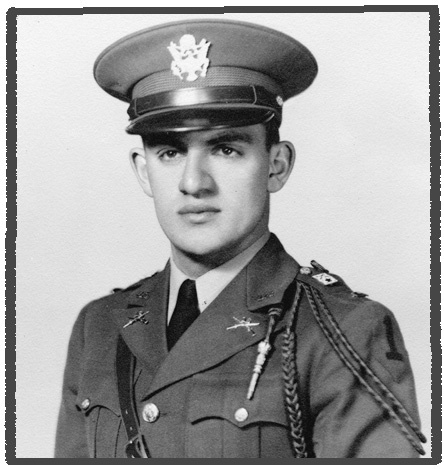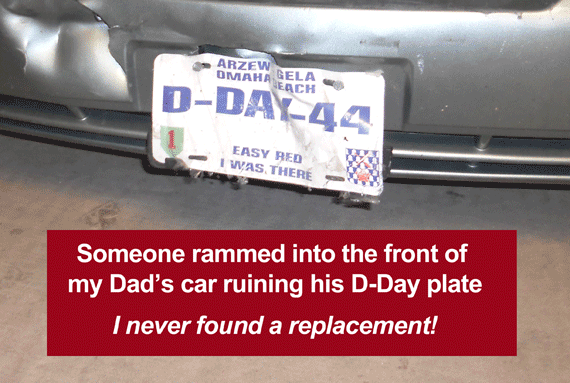Toward the later years of my Dad's life he started to get emails, letters and phone calls for interviews about his time in the army, specifically about World War II.
When Saving Private Ryan was released, both my parents (my mom was an Army Nurse) were treated to a preview of the movie and then interviewed by our local new station. They didn't say much, maybe because it was too graphic, or they just didn't want to relive it. The one thing my mother did say was: "Nobody would be walking around after being shot looking for their arm!" I think that was the nurse talking.
Below is one of the many letters I found in my dad's files. It was a request from a British University student. I am not sure where she got my dad's name, but she contacted him about her doctoral thesis. You will be able to piece together what she was asking by his answers. The title of her thesis was: "British Civilian and U.S. Soldier Relationships." My dad responded on 8/18/08.
Ashley,
First, let me say this about my military service: when I graduated from Gettysburg College in June 1940, I received a commission in the Army as 2nd Lt. The "Great Depression" was still on, so I went on active duty in the army with the 16th Infantry Regiment, 1st Infantry Division in July 1940 at Fort Jay, Governor's Island, NY. I stayed with the 16th infantry until 1945, during this period I saw combat in North Africa, landed near Oran, Tunisia, Sicily, Normandy (Omaha beach on D-Day) France, Belgium, and Germany.I was Regimental Headquarters Company Commander as well as Regimental Communication Officer in Algeria, and Tunis. Then I was a Battalion Adjutant and Battalion Headquarters Company Commander until after the Battle of the Bulge. When the war ended in 1945, I went back to civilian life but stayed in the Army Reserves until 1970 when I retired as a Colonel. My assignments in the reserves were: Battalion Commander, Division G3 (plan and training officer) and Brigade Commander.
The decorations I received were: Combat Infantry Badge, Bronze Star with 4 Oak Leaf Glusters, Legion of Merit, 7 Campaign Stars and 3 Arrow Heads for combat beach landings.
Without further ado, I'll answer your questions. Since you know the questions, I'll answer without repeating the questions.
Question #1 Before Pearl Harbor, I remember signs that said: "Soldiers, Sailors Keep Off The Grass." This attitude toward us changed dramatically after FDR declared war on Japan and Germany. I went overseas to the ETO in June of 1942 therefore I didn't experience how soldiers were treated in the states. However, after the war was over, the "GI Bill of Rights" was passed. This enabled a veteran to go to a college or university to finish whatever career was planned, to get low interest mortgages to buy a home, and there was a "52/20 Club." This was where a veteran could get $20.00 per week for 52 weeks without paying income tax. Plus, employers gave veterans preference when they applied for jobs.
While I was waiting to go to law school, I had a job where I had to hire men. It was very disturbing to me that many of the vets would not take the job my company offered, because they could get 20 dollars without working.
No, not once did anyone give me a "hard time" because I was a veteran or in uniform. Unlike the Vietnam War where the returning soldiers were treated poorly. However, I have to admit that I am so big and ugly that people would think twice before making any derogatory remarks to me or about my time in the service to our country.
Just a few weeks ago someone noticed the bumper-plate on the front of my automobile, which read, "D-Day 1944 Omaha Beach, I was there." Who ever saw this stuck a $5 bill on my windshield with: "Thank you for your service" written on it. The very next day, when I was entering a car wash, the attendant also saw the plate and asked me if I was the one who was there. When I said "yes," he said: "This wash is on me, thank you for your service." Words fail me to express my surprise.
Question #2 as the song goes: "Strangely enough I sleep well, except for a dream or two ...etc." followed by: "dream and they might come true." {Have you hear of these songs?} No, I never had nightmares. Encountering a gang of Philly thugs and my revolver not firing is the closest I have had to a nightmare.
My worst memory of the war was in the Hurtgen Forest where a truckload of replacements was dropped off at battalion headquarters. I was in charge of directing them to the company to which they were assigned. One of the replacements came up to me and said: " I'm 45-years-old with three children, I don't belong here." Looking at him, I agreed, but I told him to report to the Company Commander and tell him I said to send you back to me. The next morning, I noticed that the company he went to had some "KIA" (killed in action) one of them was this 45 year old replacement. I actually looked into what happened: just as the replacements arrived at the Command Post, an artillery barrage landed in the area killing and wounding several of the replacements. This was my worse memory because I should have called the Company Commander to tell him I was keeping the 45-year-old replacement and perhaps he would not have been killed.
Since I was always scared, it is difficult for me to pin point one or two times that were worse than others for me. I clarify my "being scared" by the fact my greatest fear was not being able to keep how scared I really was from my men.
Question #3: What I would do is cut off the fingers of anyone who deliberately and malevolently changed, altered or made-up false information about a historical fact. There I go again! I failed to "RTP." This means fail to read the question correctly.
In my opinion of how to preserve historical events is to document them with mechanical technology, if possible, DVD's, tape recorders, pictures. If this is not possible or practical, write the events down on paper as soon as possible and try to get concurrence by others as well.
I might add that in WW2 we were told not to keep diaries or take pictures. Being a Company Commander of the troops, I felt it was my responsibility to set the example by complying with the directive; hence, I don't have combat pictures or a diary. I have only my "steel trap" of a mind to rely on ☺.
My observation of people today is: they couldn't care less about facts.Should you have additional questions or need my answers to be elaborated, let me hear from you.
Charles M. Hangsterfer, Colonel (retired)
Regarding Ashley's last question, I believe my dad wanted to preserve some of the historical facts of the war. He saw so many Hollywood "re-enactments" that he felt were not truly accurate. Just months before he died, a historian from The Big Red One video-taped a two hour interview with my Dad. It has also been transcribed and is at The Cantigny Museum in Wheaton, just outside of Chicago.
I was able to watch it with my dad and hear about his participation in a world event that I never fully realized. I feel so proud to have had such a great man for my dad. As I find other letters and stories he wrote I will be posting them on this blog in his honor.


